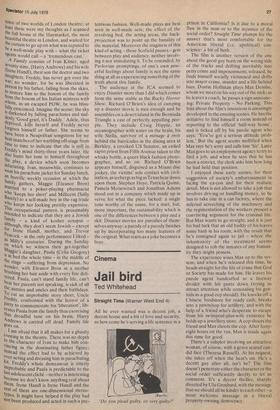Cinema
Jail bird
Ted Whitehead
Straight Time (Warner West End 4)
All he ever wanted was a decent job, a decent house and a bit of love and security, so how come he's serving a life sentence in a prison in California? Is it due to a moral flaw in the man or to the injustice of the social order? Straight Time plumps for the answer that's most comfortable for the American liberal (i.e. apolitical) conscience: a bit of both.
The film is another version of the one about the good guy born on the wrong side of the tracks and drifting inevitably into petty crime and imprisonment; released, he finds himself socially victimised and drifts into major crime, murder and a life behind bars. Dustin Hoffman plays Max Dembo, whom we meet on his way out of the nick; as he leaves a coach, he passes a sign announcing: Private Property — No Parking. This hint about the film's intentions is amusingly developed in the ensuing scenes. He has the initiative to find himself a room instead of reporting to the official 'half-way house', and is ticked off by his parole agent who says: 'You've got a serious attitude problem.' But the agent seems mollified when Max says he's sorry and calls him 'Sir'. Later Max goes to an employment agency to try to find a job, and when he says that he has been a convict, the clerk asks him how long he had held that position.
I enjoyed these early scenes, for their suggestion of society's embarrassment in facing the ex-con and for their realistic detail. Max is not allowed to take a job that involves driving or handling money, so he has to take one in a can factory, where the infernal screeching of the machinery and the regimentation of the workers present a convincing argument for the criminal life. But Max wants to go straight, and it is just his bad luck that an old buddy of his leaves some hash in his room, with the result that he's consigned again to jail — where the inhumanity of the treatment seems designed to rob the inmates of any humanity they might possess.
The experience wises Max up to the system; and when he's released this time, he heads straight for the life of crime that God or Society has made for him. He leaves his parole agent handcuffed to a freeway divider with his pants down (trying to attract attention while concealing his genitals as a good cop should). He knocks off a Chinese foodstore for ready cash, breaks into a pawnshop for artillery, and with the help of a friend who's desperate to escape from his swimpool-plus-wife existence he holds up a jewellery store. A cop shoots the' friend and Max shoots the cop. After fortyeight hours on the run, Max is inside again this time for good.
There's a subplot involving an attractive woman, of course, with a grave scared candid face (Theresa Russell). At his request, she takes off when the heat's on. He's a decent guy after all, isn't he? The film doesn't penetrate either the character or the social order sufficiently deeply to let us comment. It's a decent thriller, sharply directed by Ulu Grosbard, with the message that we should all be kinder to each other — a most welcome message in a liberal property-owning democracy.


































 Previous page
Previous page